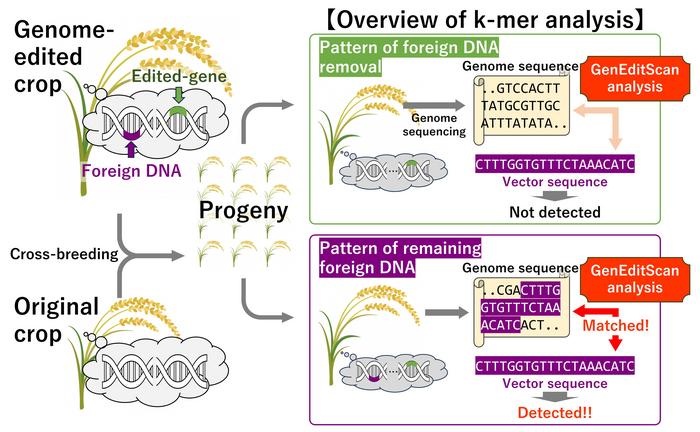Title: GenEditScan: Revolutionizing the Detection of Foreign DNA in Genome-Edited Crops
In the rapidly evolving world of agricultural biotechnology, advances in genome editing are paving the way for more efficient crop development and breeding techniques. Among these innovative technologies is GenEditScan, developed by the National Agriculture and Food Research Organization (NARO) in Japan, which has emerged as a groundbreaking tool for detecting foreign DNA in genome-edited crops. Leveraging the power of k-mer analysis, GenEditScan addresses critical challenges related to monitoring foreign genetic material during the cultivation process, thereby facilitating the safe and responsible use of genome editing in agriculture.
Genome editing technologies have gained significant attention due to their ability to introduce targeted genetic changes, enabling rapid development of new plant varieties with desired traits. While conventional methods of genetic engineering often involve random mutations, genome editing allows for precision modifications at specific sequences of the DNA. This revolutionary approach not only streamlines the breeding process but also enhances the potential for developing crops that can withstand environmental stressors, pests, and diseases.
A common practice in genome editing involves the temporary introduction of foreign DNA, which encodes a specific enzyme required to facilitate the editing process. However, the implications of residual foreign DNA in crops grown outdoors are a significant concern, especially in countries like Japan where stringent regulations are in place. Ensuring that this foreign DNA is completely removed before planting is essential for compliance with safety and environmental standards. It is here that GenEditScan takes center stage.
GenEditScan, the latest innovation from NARO, represents the culmination of years of research and development in k-mer analysis methodologies. The fundamental premise behind k-mer analysis is its ability to analyze sequences of DNA and identify specific subsequences, or k-mers, which can reveal the presence of foreign elements. This process relies on data derived from next-generation sequencing, allowing for the analysis of vast quantities of genomic data with high efficiency. However, earlier versions of this methodology posed challenges due to their complexity and the expertise required for accurate interpretation of results.
Recognizing the need for user-friendly solutions without compromising on accuracy, NARO embarked on a mission to refine these analytical tools. The resultant GenEditScan tool simplifies the process of determining whether residual foreign DNA from genome-edited crops remains, making it accessible to a broader range of researchers and agronomists. By requiring only basic genomic input data, GenEditScan reduces the barriers to entry for users lacking specialized training in genome analysis.
One of the notable advancements of GenEditScan lies in its capacity to minimize false positives through robust statistical corrections. By adjusting the analysis results generated during the k-mer evaluation, the tool can significantly reduce erroneous detections, enhancing the reliability of the findings. This feature holds great importance for researchers in agricultural settings, particularly as the need for precise testing grows alongside the increasing popularity of genome-edited crops.
Dr. Hiroaki Sakai, a prominent researcher involved in the project, emphasized the tool’s user-centric design, stating that GenEditScan enables anyone, regardless of their prior experience or expertise, to obtain consistent results. This democratization of genomic analysis signals a significant leap forward in making advanced agricultural tools accessible to a diverse array of stakeholders, including farmers, agricultural scientists, and regulatory bodies. Such inclusivity is vital for fostering broader public acceptance and understanding of genome editing technologies.
The GenEditScan tool has already demonstrated its potential through practical applications in testing various crops that have undergone genome editing, including rice, potato, and wheat. Its introduction aligns with Japan’s commitment to developing safe and effective agricultural practices that can keep pace with innovations in biotechnology. As global interest in genome editing intensifies, GenEditScan stands poised to become a standard testing method for ensuring the integrity of genome-edited crops, both domestically and internationally.
Together with its predecessor, the tools developed by NARO have been instrumental in supporting Japan’s regulatory framework concerning genome-edited crops. The success of these methodologies sets a precedent for the adoption of similar analytical techniques in other regions, promoting responsible practices in crop development across the globe. NARO’s ongoing research and development endeavors signal an unwavering determination to propel the agricultural sector into a new era defined by technological advancement and scientific insight.
The significance of this research extends beyond the immediate benefits of crop safety and compliance; it represents a broader movement towards sustainable agriculture. As researchers and developers strive to create crops that can cope with the challenges posed by climate change and food security, innovations like GenEditScan serve as critical enablers. Such tools not only support regulatory compliance but also empower scientists to harness the full potential of genome editing technologies responsibly.
As society navigates the complexities of agricultural biotechnology, projects like GenEditScan highlight the collaborative efforts between research institutions and governmental bodies—including financial support from the Ministry of Agriculture, Forestry and Fisheries (MAFF)—that drive progress. This partnership exemplifies the commitment to scientific advancement while ensuring ethical considerations and public safety remain at the forefront of agricultural development.
In summary, GenEditScan emerges as a vital tool in the continued evolution of genome editing technologies for agricultural applications. By elucidating the presence of foreign DNA in crops and providing accessible means of analysis, it promotes a culture of transparency and responsibility in the use of genetic technologies. As NARO champions the development of such tools, the future of genome-edited crops appears more promising than ever, with the potential for transformative impact on global agriculture.
Subject of Research: The development and analysis of genome editing tools.
Article Title: GenEditScan: Revolutionizing the Detection of Foreign DNA in Genome-Edited Crops
News Publication Date: October 2023
Web References: https://github.com/hirsakai/GenEditScan
References: National Agriculture and Food Research Organization (NARO) publications.
Image Credits: Credit: National Agriculture and Food Research Organization (NARO)
Keywords: Genome editing, k-mer analysis, biotechnology, crop safety, DNA detection, agricultural technology.
Tags: Agricultural biotechnologyCrop safetyFalse positive reductionForeign DNA detectionGenome editingk-mer analysisMAFF-supported researchNARO Japannext-generation sequencingRegulatory compliancesustainable agricultureUser-friendly genomic tools





